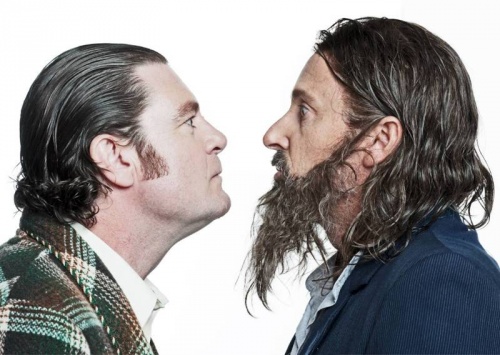Horseplay
08/05/2010 - 29/05/2010
Production Details
with the Maidment Theatre, 09 308 2383
CREATIVE TEAM
Absurd, rambunctious literary romp
Review by Janet McAllister 10th May 2010
Horseplay is rambunctious and humorous, full of drink and literary allusions with a touch of rural gothic horror (cue screechy violins). This is all satisfyingly suitable for a play depicting a fictitious chance meeting between The Scarecrow writer Ronald Hugh Morrieson and poet James K Baxter – two of New Zealand literature’s most charismatic, maverick, alcoholic bawds.
It’s a fantastic, Stoppard-like scenario and both Ken Duncum’s farfetched, pun-laced, real-time script and this Simon Bennett-directed, larger-than-life production more than live up to it. There are Baxter self-quotations and talk of cut-throats and fowlhouses for literary experts to spot, but you don’t have to know a line of the great men’s work to enjoy the play and its absurd tableaux involving half a dead horse. [More]
[See Forum: Horse Play, Horse $#%&]
_______________________________
For more production details, click on the title above. Go to Home page to see other Reviews, recent Comments and Forum postings (under Chat Back), and News.
Copyright © in the review belongs to the reviewer
Erudite hilarity, gripping yarns, private sadness and some regret
Review by Kate Ward-Smythe 09th May 2010
Part farce, part slapstick, yet all heart, poetry and inspired language, Horseplay gives celebrated New Zealand playwright Ken Duncum an abundance of poetic and comic licence, as he boldly empowers himself as the voice-box of two great New Zealand literary artists: poet James K Baxter and novelist Ronald H Morrieson.
The unlikely (and yet entirely possible) premise – that in 1972, while on the run from Jerusalem’s turgid expectation, Baxter hitches a lift with Morrieson to Hawera; becomes inextricably linked to the dead horse Morrieson collects on the way; meets his doddery Aunt and frustrated impatient would-be girlfriend; then finds out that he is Morrison’s nemesis – allows Duncum to communicate brilliantly to his audience on several levels.
Not only does he immerse us in poignant verse and evocative prose (in the styles of Baxter and Morrieson), plus hurl side-splittingly funny dialogue at the situation, but he also takes the opportunity to depict how these literary giants withered in their twilight years, and failed in their personal lives – as family men, providers, and nurturers.
The overall result is a unique mix of erudite hilarity, gripping yarns, private sadness and some regret.
Director Simon Bennett, who shifts back into theatre gear after years of driving television productions, does a superb job of navigating through this complex beast. Baxter and Morrieson both died as relatively young men in 1972, their bodies and dreams broken and ravaged by alcoholism. Bennett guides his gifted cast through the farcical journey with just the right mix of wit and angst.
With pace and presentation in good synch, Bennett’s decision to reunite a “dream team” of actors and creatives from his Watershed theatre days of a decade ago, pays off.
Tracey Collins’ set design puts a nice distorted angle in an otherwise typical Hawera weatherboard family home, and creates the perfect familiar domestic environment.
As the play takes place in the same naturalistic setting, lighting designer Bryan Caldwell has limited opportunities. However, his subtle changes in illumination and intensity are all that is needed to enhance our enjoyment of the night.
Sound designer John Gibson adds a nice “Psycho” touch to the first half’s melodramatic cliffhanger.
Toni Potter does well with her portrayal of Wilma, the brash aging town tramp and long suffering girlfriend of Morrieson, desperate to settle down. Potter throws herself into the role enthusiastically, yet skillfully gives Wilma some believable vulnerability and takes full advantage of any blunt honesty scripted, such as when she tells Baxter to “dump the doom and gloom and get back to your wife and kids.”
As Morrieson’s (equally long suffering) Aunt, Elizabeth McRae is wonderfully understated yet familiar. She is an absolute pleasure to watch, as she seeks to re-establish the order of any day, with a nice cup of tea. Or a quick sherry.
However, understandably, the night belongs to John Leigh and Tim Balme.
Each consumes their character as their rivalry and jealousy thickens. Leigh masters the Kiwi vernacular and the heart of angry man Morrieson, stuck in the past, stuck in Hawera, struck with inertia after the death of a loved one. A bare-foot Balme, with wild blue eyes and a disturbing obsession with death and failure, is the embodiment of Baxter.
While they are the perfect comic duo – each actor feeding off the other as they fight then bond over women, booze, critics, cramps, authority, expectation and recognition – whenever either break into pure poetry, both Leigh and Balme single-handedly own the stage. In particular, Leigh’s ‘Ode To Hawera’, is sublime.
Full marks to the Auckland Theatre Company for resurrecting this hilarious literary gem, 16 years after it’s first (and only other)* professional production at Bats in Wellington; and in synch with Auckland’s Readers & Writer’s Week: sweet poetic justice.
Footnote: Don’t be late: In the opening minutes, thanks to the clever work of ATC’s technical production team, there is a physical commotion on stage that you simply won’t want to miss.
– – – – – – – –
*See Tommy Honey’s comment below.
[See Forum: Horse Play, Horse $#%&]
_______________________________
For more production details, click on the title above. Go to Home page to see other Reviews, recent Comments and Forum postings (under Chat Back), and News.
Copyright © in the review belongs to the reviewer
Comments
Tommy Honey May 9th, 2010
Great review Kate; frustrated that I won't get to see the show as I think it is one of our greatest comedies. A small point - it has had another professional production in Dunedin in 2000, directed by Gary Henderson. I was lucky enough to design it.
Make a comment
You must be logged in to post a comment.





Comments